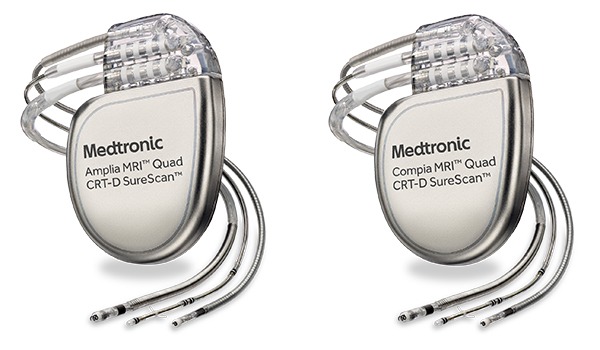
Medtronic has announced that it is the first company to receive US Food and Drug Administration (FDA) approval for magnetic resonance imaging (MRI) conditional cardiac resynchronisation therapy defibrillators (CRT-Ds) for the treatment of heart failure.
The Amplia MRI Quad CRT-D SureScan and Compia MRI Quad CRT-D SureScan systems are approved for MRI scans on any part of the body without positioning restrictions. Now, patients in the USA who receive these devices should have access to MRI scans if and when they need them. Both CRT-D systems will be commercially available in the coming months.
“What is clear from the data and my own personal experience is that a large majority of CRT-D patients will likely need an MRI at some point. Now that CRT-D MRI devices are approved, patients can receive an MRI in a straightforward manner,” says J Rod Gimbel, Case Western Reserve University, Cleveland, USA. “This is a significant development for heart failure patients with CRT-D therapy.”
The Amplia MRI and Compia MRI CRT-Ds with quadripolar technology are designed to offer physicians multiple options to help treat heart failure by optimising CRT delivery, which may improve patient outcomes.
The Amplia MRI device features the AdaptivCRT algorithm, which has been shown to reduce a patient’s odds of a heart failure hospital readmission (within 30 days) by 59% (vs. echo-optimised CRT). The AdaptivCRT feature also has been shown to improve CRT response rate by 12%, and to reduce atrial fibrillation (AF) risk by 46% compared to echo-optimised BiV pacing.
Both newly approved devices can be paired with the Attain Perfoma MRI SureScan Quadripolar Leads, of which the entire portfolio is approved for MRI scans: Dual Cant MRI SureScan Model 4298, Straight MRI SureScan Model 4398 and S MRI SureScan Model 4598.
With 16 pacing configurations and shorter spacing between the two centre electrodes, these quadripolar leads have been shown to reduce the incidence of phrenic nerve stimulation. Attain Performa leads also include steroid on all four electrodes for lower chronic pacing thresholds, which should contribute to greater device longevity and reduce the likelihood of phrenic nerve stimulation. The systems also include VectorExpress technology, an automated in-office test that is designed to reduce lead programing to two minutes, and reveals clinically actionable information to help physicians select optimal pacing configurations for each patient.












